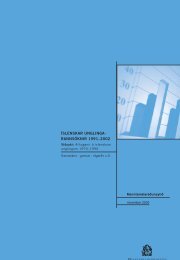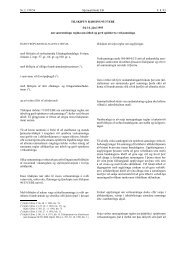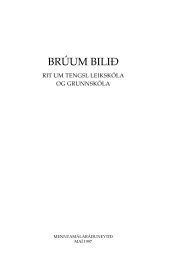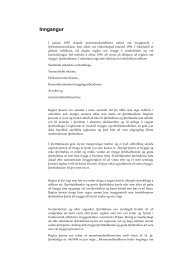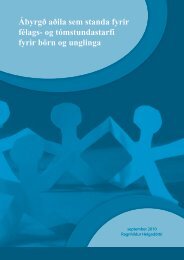Arts and Cultural Education in Iceland : Professor Anne Bamford
Arts and Cultural Education in Iceland : Professor Anne Bamford
Arts and Cultural Education in Iceland : Professor Anne Bamford
Create successful ePaper yourself
Turn your PDF publications into a flip-book with our unique Google optimized e-Paper software.
Go<strong>in</strong>g to local schools… well we talk about it, but none of us do that. Newer schools have a music department.<br />
We only do 2 lessons per week <strong>in</strong> a local school. I’m not fond of do<strong>in</strong>g it . If you work with<br />
children <strong>in</strong> schools you can only teach them the basics. In some ways it would be easier for all if the children<br />
could come to music lessons dur<strong>in</strong>g school time. The child would not be so tired. It would be more convenient for<br />
the parents <strong>and</strong> the child. It would be convenient for the teacher <strong>and</strong> they would f<strong>in</strong>ish earlier. It might be<br />
convenient but it is def<strong>in</strong>itely NOT professional. Pre-primary school classes can ‘buy <strong>in</strong>’ time.<br />
As can be seen <strong>in</strong> Figure 1.12.8, the majority of music schools still operate outside the<br />
compulsory school, with only 3% work<strong>in</strong>g <strong>in</strong>side the compulsory school.<br />
Figure 1.12.8 Facilities <strong>in</strong> which the school operates music school<br />
One advantage of closer l<strong>in</strong>k between the music school <strong>and</strong> the compulsory school could be<br />
improvements <strong>in</strong> the compulsory basic curriculum <strong>in</strong> music. For this broader music education,<br />
the situation <strong>in</strong> compulsory school is not as good although it can vary from school to school.<br />
There is a perception that the strength of the music schools has meant that there has been a<br />
‘talent dra<strong>in</strong>’ (especially of teachers) away from music education <strong>in</strong> the compulsory school, as<br />
this comment suggests, “Music is like that. It is an emotional th<strong>in</strong>g. There is always therefore a<br />
difficulty <strong>in</strong> discipl<strong>in</strong>e [<strong>in</strong> compulsory school]. Teachers are do<strong>in</strong>g other th<strong>in</strong>gs <strong>and</strong> do not see it<br />
as a priority. Visual <strong>Arts</strong> is a very solid subject <strong>in</strong> the public schools, music generally though is <strong>in</strong><br />
bad shape [<strong>in</strong> compulsory school]."<br />
While the salaries of the Music School teachers is paid by local government, parents still<br />
have to make a considerable contribution to the cost of music school. This cost varies from<br />
centre to centre, but the sampl<strong>in</strong>g suggests an <strong>in</strong>dicative total would be about 57,000 ISK for the<br />
school year. There do not appear to be any special provisions for poorer families, though<br />
<strong>in</strong>dividual centres do make specific arrangements on a one off basis for families that may not be<br />
able to afford lessons. It was suggested that many families would be reluctant to ‘admit’ to<br />
need<strong>in</strong>g support to pay music fees. Follow<strong>in</strong>g the recent f<strong>in</strong>ancial down turn, concern has been<br />
expressed over the ongo<strong>in</strong>g capacity of parents to pay music fees. At this po<strong>in</strong>t, schools have not<br />
seen any overall reduction <strong>in</strong> families attended, though there is concern that this might change<br />
<strong>in</strong> the future. This does appear to be the case as music schools reported more people mov<strong>in</strong>g to<br />
‘half time’ offers (i.e. one lesson per week <strong>in</strong>stead of two). Other directors of music schools<br />
noted an <strong>in</strong>crease <strong>in</strong> parents be<strong>in</strong>g late with payments or us<strong>in</strong>g credit cards to make music<br />
school payments. This situation will need to be monitored over the com<strong>in</strong>g months <strong>and</strong> it may<br />
be necessary to provide some form of scholarship or endowment for children of low <strong>in</strong>come to<br />
be able to pay for music lessons.<br />
The teachers <strong>in</strong> music schools are very <strong>in</strong>ternational. In fact it would appear from the visits<br />
that the majority of teachers <strong>in</strong> music schools do not come from Icel<strong>and</strong>. It is argued though that<br />
these <strong>in</strong>ternational teachers br<strong>in</strong>g high st<strong>and</strong>ards <strong>and</strong> <strong>in</strong>ternational experience <strong>and</strong> ‘richness’ to<br />
43


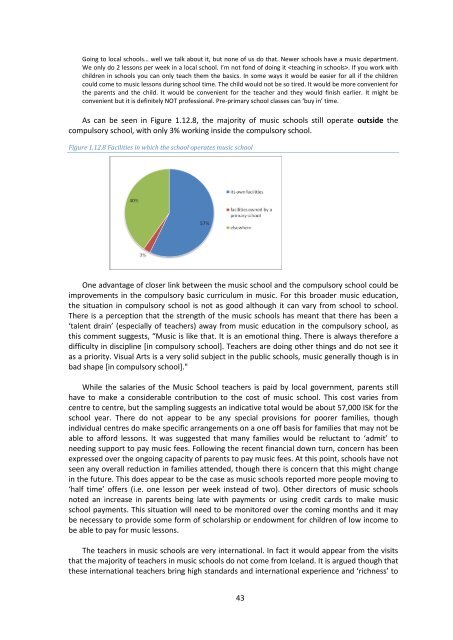

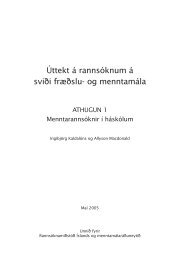
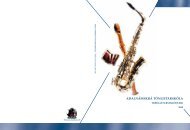
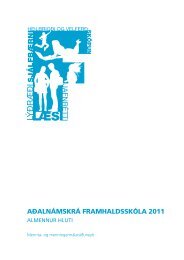
![Aðalnámskrá tónlistarskóla : rytmÃsk tónlist [Eingöngu á rafrænu formi]](https://img.yumpu.com/50843672/1/184x260/aaalnamskra-tanlistarskala-rytma-sk-tanlist-eingangu-a-rafranu-formi.jpg?quality=85)

